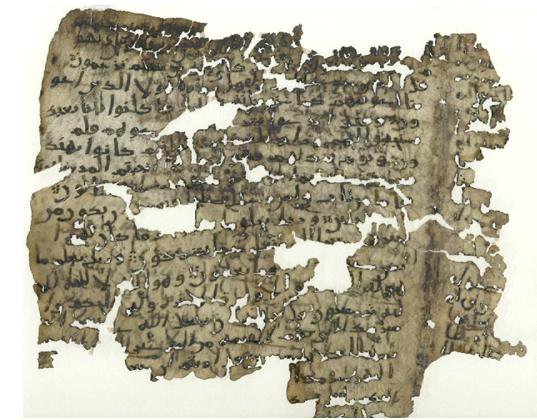
The Companions of the Prophet and the early Tābiʽūn[1] used to read the texts of the Qur’ān according to what they thought God Almighty meant by it, doing so directly and determining the meaning through a live interaction with the living vocabulary of the text. The same went for the Companions who lived at the time when the Qur’ān was revealed, in a language they lived with on a daily basis, employing the mechanisms of positive interpretation that did not depart from the Arab linguistic and cultural norms in which the Qur’ān was revealed.
AND THE SAME GOES for the early Tābiʽūn. All this was far cry from anyone imposing his ideological desires upon the Qur’ān. This state of affairs – a fruitful positive interaction with the Qur’ānic text – continued until the Khārijites[2] sowed the seeds of deviation from a scientific reading of the Qur’ān in favour of an ideological reading of it. Along with this they justified their rejection of the arbitration that took place between ‘Alī ibn Abī Tālib and his Syrian rivals, on the grounds that ‘dominion belongs to God alone,’ and in so doing stripped away the historical context from the verses that spoke of God Almighty’s dominion, verses whose true meaning can only be determined by taking that context into account.
But the beginning of the real deviation from the scientific reading of the Qur’ān came at the hands of the Umayyads[3] when they undertook to legitimize Islamic rule. This spurred them to fabricate a coercive ‘legitimacy’ based on a claim that God Almighty had granted them their dominion by the precedent of His divine decree. Consequently God it was who granted them the authority to violate taboos or shed blood or break what had been sanctified prohibitions. Due to the ‘legitimisation’ of this fatalism they proceeded to place preachers and storytellers on a professional footing, so that these would interpret the texts of the Qur’ān – particularly those whose apparent fatalistic meaning were conducive to them – in a way that would buttress their claims to be following the divine command whenever they oppressed the people and violated their sanctities.
A seed of this type inevitably bore fruit when it was sanctioned in an official/doctrinal manner to it, as the Umayyads did whenever they had to apply force. Such fruit was eaten whenever the advocates of qadariyya (free will) – opponents of this fatalism – raised the question of ‘the creation of acts.’ By speaking of this their intent was to make the Umayyad rulers bear responsibility for the oppression perpetrated at their hands, but were resisted by the advocates of Fatalism who were subservient to the Umayyads. The dispute subsequently developed into one between the Muʽtazila – who held to the ‘createdness of the Qur’ān’ on the grounds that there was no large number of ancients supporting their opponents’ view, and the Hanbalites – who spoke of the Qur’ān being ‘revealed, not created’. Neither of the standpoints initially caused any problem in determining the meaning of the Qur’ānic text, but it was the appearance of views oscillating between them, and the multiplication of partisans and rivals of either view, that allowed ample room for inaugurating an ideological interpretation of the Qur’ān, one that has lasted from that period to the present day.
Recourse to the Text in most cases went completely against God’s intention
The characteristics of human civilization (as Ibn Khaldūn[4] put it) demand that the viewpoint dominating the arena should take a hard line, not only by expelling its rival but also by imposing an ideology that swings to the far right with respect to preaching the codes of behavior in presenting one’s thoughts and the theory that these espouse. The traditionalist view, which expelled the Muʽtazilite view from the arena, supported a version that was unable to develop the concept of interpreting the Qur’ānic text in a manner aligned with the new developments of the modern age. Such a version, enacted through the famous touchstone: ‘the Qur’ān is revealed, not created,’ is a true enough statement in a general sense, but it subsequently spawned a Qur’ānic interpretation incapable of making a distinction between the axes of the Qur’ānic text.
The result of this was that recourse to the Text for authority – especially to texts referring to human behavior, relations and freedom – in most cases went completely against God’s intention by them. This will become clear as we present a number of examples of this muddled citation of evidence.
Before this, the issue requires us to point to the fact that the Qur’ān is made up of a core text that is disseminated via three principal axes: the axis of the enunciator, the axis of the recipient, and the axis of the absent enunciator of it. For instance, what may emerge from the texts via the mouth of the recipient is not the expression enunciated by the Almighty, but rather an utterance which Almighty God directed to the tongue of the recipient (the Messenger) for a key purpose in the function of the Text. Similarly, the words borne by the texts in the mouths of those who are not present but referred to in the Qur’ān, or matters referring to them, do not represent the actual words of God Almighty, since their content may be in opposition to God’s purposes and judgment. God is directing these words too, but for a specific function in the Qur’ānic text.
The problem is the lack of a division between the axes of the Qur’ānic text
The major problem which the traditional view has bequeathed to the coming generations of Muslims (in terms of how to read the Qur’ān) is this lack of a division between the axes of the Qur’ānic text when it is cited as evidence, in that all of the texts are read as if they were God Almighty’s words. This has paved the way to enshrining many aspects of oppression and injustice in Sharīʻa law – particularly in those which touch on women. It has also made social inequality among people ‘Sharīʻa’, as something that corresponds to the will of God, and stripped the texts (which are the word of God alone) of their various contexts, by which alone their meaning can be established. All this is done either on the pretext that everything is the word of God, or in conformity with the dictum:
‘Precepts are derived from the universality of the expression, not the specificity of the context’.
Here I will give some examples of some Qur’ānic texts which fall under the axis of the absent enunciator, and which we nevertheless generally read as the very word of God Almighty and expressing His will. These have come to be perpetuated in Salafist methodology as the ultimate result of the anthropomorphism and de-anthropomorphism that practical and intellectual experience went through at the beginning of Muslim history. When the preacher and the storyteller (and how many of these there are in our society!) wish to settle their male chauvinist whims upon women in describing her as alone responsible for the temptation that men suffer, they are not slow to take as evidence the first part of verse 28 of the sura Yūsuf: Lo! the guile of you is very great,[5] despite that fact that these are God’s words God related through a specified absent enunciator, the Grandee of Egypt (its chief minister) at the time of the Hyksos, when Yusuf’s innocence was established and his wife implicated in a misdemeanour.
Consequently these words are not the judgment of God upon womankind. What is strange is that the relaters of these tales are not embarrassed to describe women as deficient in intellect and religion when expressing their conviction as the superiority and dominion of the man over her, even though this contradicts their statement on the greatness of their guile, a greatness which can only exist through the power of her intellect.
They make Sharīʻa’ out of injustice, social coercion and class inequalities
Whenever they wish to enact some male chauvinistic legislation against women they do not hesitate to adduce what is contained in verse 36 of the sūrat Āl ‘Imrān: the male is not as the female. They attribute this chauvinistic distinction to God Almighty, even though it is an ancient Israelite male chauvinistic norm which God Almighty directed in reproach for such a distinction, in connection with the tale He directed concerning the mother of the lady Maryam bin ʽImrān and her vow to dedicate what was in her womb to the service of the Israelite temple which only allowed males to accede to the honour of its service.

Suggested Reading
In another context they wish to establish that social inequality among human beings is the will of God, so that people may be made subservient to others (far be it for the Lord of Glory and Majesty to wish such a thing), and they adduce His words:
We have apportioned among them their livelihood in the life of the world, and raised some of them above others in rank that some of them may take labour from others[6]
Yet these verses in reality are a reproach from God Almighty to those societies that practice social inequality (which is a product of humans themselves) as a pretext for pride, arrogance, vanity and cynicism towards those in a lower class than themselves, as evidenced by the Almighty’s following the above with the end of the verse which runs:
and the mercy of thy Lord is better than [the wealth] that they amass.
This is how the ideological reading of the Qur’ān works. Not content with disassociating the Qur’ān from the present age and its problems, they add to this by ‘making Sharīʻa’ out of injustice, social coercion and class inequalities by claiming that these are the judgment of God Almighty, His divine decree and His will, so as to re-produce a new/old Umayyad fatalism at the expense of contentment with the Qur’ān as an active arbiter in the life of mankind.
[1] ‘Those who came after’. See Glossary – ‘Tābiʽī’
[2] See Glossary.
[3] The Umayyads (Banū Umayy) were the second of the major Caliphates of Islamic history (following the era of the Orthodox Caliphs) and ruled over the whole of the newly-won Arab conquests between the years 661-750 AD, with their capital at Damascus. Their rule tended towards Arab chauvinism in their favouring of the rights of old Arab families over against those of Muslim converts. They are held to have transformed the Caliphate from a religious institution into a dynastic one, under a conception that Islam was the property of a conquering dynasty. They notably referred to themselves not as the ‘caliphs (‘successors’) of the Messenger of God,’ as came to be the accustomed formula, but as ‘caliphs of God’, that is, as God’s direct representatives at the head of the Muslim community. (Ed.)
[4] Author of the famous Muqaddima (‘Introduction’) to his extensive work of history which, with its attempt to analyse the causes of the rise and fall of dynasties, constitutes an early example of scientific historiography. His analysis (dating from 1377 AD) embraces elements of philosophy, social science, demography, cultural history and economics. (Ed.)
[5] The context of the verse So when he saw his shirt torn from behind, he said: Lo! this is of the guile of you women. Lo! the guile of you is very great [Qur’ān, XXII, 28] is the Biblical account of Joseph’s entanglement with Potiphar’s wife (names in Muslim tradition as Zulaykha) who attempted to seduce him, tearing the shirt off his back as he made for the door. The fact that his shirt was torn from the back convinced her husband that Joseph was innocent of her claims to have been forced. (Ed.)
[6] [Qur’ān XLIII, 32]

